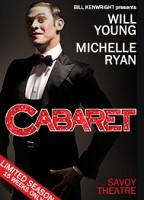Cabaret Review 2012
It is almost 6 years ago to the day that I first saw this version of 'Cabaret' directed by Rufus Norris. Not very much has changed in the intervening period, though the show has now made its way eastwards, having started at the Lyric and now firmly in residence at the Savoy Theatre. The move obviously presented the opportunity to change things quite radically, but the creative team has declined the offer (apart from some tweaks) and opted to stick with the original formula which obviously must have seemed like a winner.
If you have never seen the film, or indeed the stage version before, the story is about a young American, Cliff Bradshaw (played here by Matt Rawle), who finds cheap lodgings in the house of one Fräulein Schneider (Sian Phillips). Arriving at the railway station in Berlin, he is befriended by Ernst Ludwig who turns out to be a member of the Nazi party and something of a money launderer - or, at least, involved in some kind of smuggling - for which he tries to recruit the initially naïve Cliff. At a cabaret, The Kit Kat Club, Cliff meets singer Sally Bowles who later moves in with Cliff at his lodgings. In the meantime, the brutal Nazis are gaining political power, and the freedom which many Berliners have previously enjoyed is about to come to an abrupt end.
First performed on Broadway in 1966, the show is based first on the writings of Christopher Isherwood who experienced first-hand the sexually liberated, hedonistic Berlin of the declining years of the Weimar Republic. Isherwood's experiences were encapsulated in various stories including that of Sally Bowles. Later in 1952, John Van Druten turned Isherwood's stories into a play entitled 'I am a Camera' - the title being a quote from Isherwood's 'A Berlin Diary', set in the Autumn of 1930. And later still, in the 1960s, John Kander and Fred Ebb wrote the music and lyrics, with the book by Joe Masteroff.
What struck me this time round was the considerable amount of the show which is devoted to the boarding-house landlady Fräulein Schneider. Back in 2006, Sheila Hancock won the Olivier Award for best supporting actress in this role, and deservedly so. Here, Sian Phillips invests the role with a kind of weary acceptance. Though she tries to stamp her authority on her tenants, Fräulein Schneider fails miserably and has to 'come to arrangements' with them, knowing she must do so in order to survive. And that is what Fräulein Schneider is, a survivor, and she is intent on surviving whatever the personal cost.
Last time I saw this production, James Dreyfus proved a rather sinister and quirky lead in the role of Emcee. Here, Will Young takes up the reigns and gives us a rather different portrayal. The Emcee is a tough role to crack because the character is so difficult to understand. He is a clown, a shrewd manipulator of the audience in the cabaret and obviously highly intelligent. But we do not find out much more about his background or his motivation for working in a cabaret. Will Young gives us rather more of the clown in his Emcee, but also suggests a more serious, more enigmatic character lurking within.
As is I said in my previous review, it really is hard to look at this stage version without referencing the film version with Liza Minnelli as Sally Bowles and Michael York as the Englishman, Brian Roberts, visiting the sexually-liberated Berlin at the turn of the decade between the 1920s and 30s. A couple of couples who were sitting behind me - by coincidence both celebrating wedding anniversaries - found the gear shift between film and stage versions rather striking and unexpected - even so, they liked this stage version, I hasten to add. I would think many people will have the same shock, if that is not too strong a word. In many ways, the stage version is a very different animal to the film, and to be objectively fair, they really ought not to be subjected to direct comparison, though that may be a bridge too far for most. In fact, this stage version would be better described as a musical play, or a drama with music, and this is firmly demonstrated in Rufus Norris's honest and authentic direction.
It may sound strange, but the real power of Mr Norris's production actually lies in the bleak ending, laden with foreboding. As the Nazis begin to flex their political muscle, the cabaret bars are some of the first victims of the new regime. Simply executed, the denouement is nonetheless incredibly powerful, and also immensely sad.
The overall quality of the production is high with satisfying performances all-round, along with award-winning choreography. And with the highly popular Will Young in the lead, this incarnation of 'Cabaret' looks set fair for a further lengthy run.
"The chilling descent into Nazi nightmare isn't realised with enough intensity. The central relationships don't fully convince, and there is a lack of sensuality. "
Henry Hitchings for The Evening Standard
"The final 20 minutes of Rufus Norris's revamped revival of Cabaret are shockingly good."
Michael Billington for The Guardian
"Patchy but inventive production."
Charles Spencer for The Daily Telegraph
Originally published on
